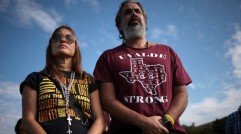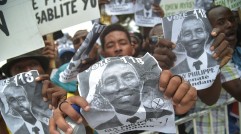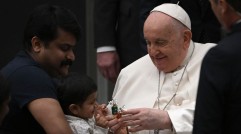Hillary Clinton vs Bernie Sanders: Poll Shows Sanders Might Spell Trouble for Clinton in New Hampshire
Democratic presidential frontrunner Hillary Clinton is feeling some unlikely heat from socialist Vermont Sen. Bernie Sanders, who is surging in polls in New Hampshire, USA Today reported.
That means the party's nomination might actually be contested in the Granite State, which traditionally holds the first-in-the-nation primary, the newspaper predicted.
According to a Suffolk University Poll conducted over the weekend, Clinton still holds a lead among likely Democratic primary voters, 41 percent of whom favor the former secretary of state; but Sanders clocked in at an impressive 31 percent -- "one of his best showings" in New Hampshire, according to the Hill.
And even though it is unlikely the Vermont senator can mount a realistic threat to Clinton across the nation, the presumed frontrunner should be worried as the "findings underscore some of her challenges," USA Today commented.
"Nearly three in four Democrats have a favorable impression of Clinton, but even this friendly group is inclined to think that controversies over the Benghazi attacks in Libya, her use of a private email server while secretary of State and the contributions by foreign governments to her husband's foundation will hurt her in a general election," the newspaper noted.
The Hill dubbed Sanders "the leading liberal challenger to Clinton," noting that Massachusetts Sen. Elizabeth Warren -- a favorite within the Democrats' liberal wing -- has ruled out a 2016 White House bid. The Vermont socialist also benefits from the name recognition he enjoys in neighboring New Hampshire.
The 73-year-old, "a fixture" on Vermont's political scene, was first elected to the U.S. House of Representatives in 1991; he ascended to the U.S. Senate in 2007. Sanders had kicked off his political career as mayor of the Green Mountain State's largest city, Burlington, a post he held for eight years.
The Suffolk University Poll, meanwhile, spelled trouble for the remaining Democratic candidates -- both announced and unannounced: Vice President Biden finished third with 7 percent, followed by former Maryland Gov. Martin O'Malley at 3 percent; former Rhode Island Gov. Lincoln Chafee and former Virginia Sen. Jim Webb came in at about 1 percent each.
Subscribe to Latin Post!
Sign up for our free newsletter for the Latest coverage!
* This is a contributed article and this content does not necessarily represent the views of latinpost.com














